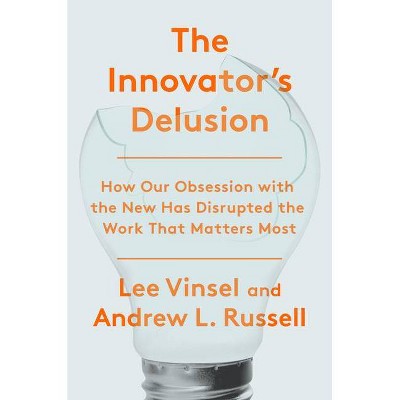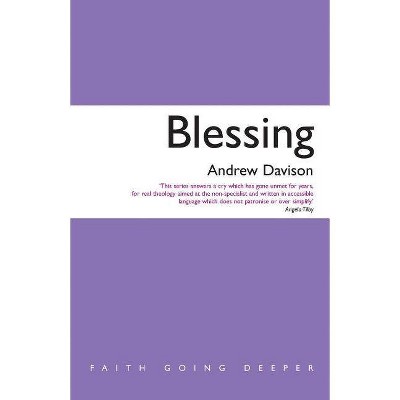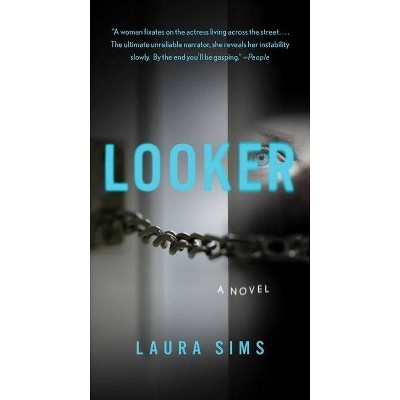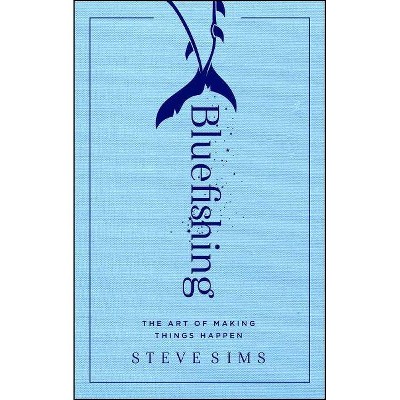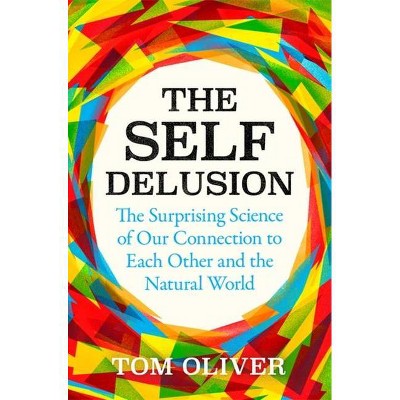Is Faith Delusion? - by Andrew Sims (Paperback)
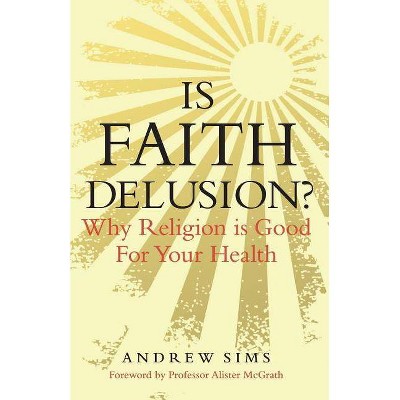
Similar Products
Products of same category from the store
AllProduct info
<p/><br></br><p><b> About the Book </b></p></br></br>How, in a scientifically and technologically advanced age, can people still believe in God? Andrew Sims examines both the connection and the division between Christian faith and psychiatry.<p/><br></br><p><b> Book Synopsis </b></p></br></br><br/> Is faith delusion? Is religion bad for your health? How, in a scientifically and technologically advanced age, can people still believe in God/spirit/'other'? Clearly not all believers are primitive and ill-educated; an alternative explanation is that they must be mad, or at least severely neurotic (as suggested by Freud). <br/> This book starts by looking at, and giving reasons for, the connection and the division between Christian faith and psychiatry. It asks whether science challenges Christians involved with psychiatry, as patients or professionals, and whether the spiritual needs of patients are recognised. The author examines the scope and use of the neuro-sciences and considers cause and effect, natural selection and determinism. He explores the overlap (and the difference) between psychiatric symptoms and religious belief, the possible association between demon possession and mental illness, and the idea that some people are intrinsically religious and some are not. The variations of personality are examined, with their implications for belief. <br/> Posited as a statement, that faith is delusion is always hostile, but outcome studies (reviewed here) show that in general religious belief and practice convey good mental health. Religious faith and mental illness are different, and their concepts come from different world-views. A consideration of them in relation to each other is long overdue. <br/> The author is a former Professor of Psychiatry and President of the Royal College of Psychiatrists, and has also been Chairman of their Spirituality and Psychiatry Special Interest Group, so is exceptionally well qualified to address the subject. Although the book is technically proficient, it is aimed at the general reader and is illustrated with stories, brief case histories and anecdotes.<p/><br></br><p><b> Review Quotes </b></p></br></br><br>'And now for the yes. This is a thoughtful history of the struggle between religion and secular psychiatry... This personal account is also extremely frank and for that reason highly interesting. It is rare for a psychiatrist to write with so much emotion on his sleeve and for that reason alone it is to be welcomed.'--Sanford Lakoff<br><br>"Pastors will find this book useful as well as those who are professionally involved in psychiatry." --Sanford Lakoff "Church Of England Newspaper "<br><br>"This is a remarkable book...extremely competent, erudite and readable." Church Times--Sanford Lakoff<br><br>Normal 0 false false false MicrosoftInternetExplorer4 /* Style Definitions */ table.MsoNormalTable {mso-style-name: "Table Normal"; mso-tstyle-rowband-size:0; mso-tstyle-colband-size:0; mso-style-noshow: yes; mso-style-parent: ""; mso-padding-alt:0cm 5.4pt 0cm 5.4pt; mso-para-margin:0cm; mso-para-margin-bottom: .0001pt; mso-pagination: widow-orphan; font-size:10.0pt; font-family: "Times New Roman"; mso-ansi-language: #0400; mso-fareast-language: #0400; mso-bidi-language: #0400;} "I have read this book with great admiration, with edification I would say, not just because I share the same religious dedication. However, I am a bit afraid to put it this way, as if it is no more than just a pamphlet written by an elderly man, who arriving at the end of his career needs to say once more what is only interesting for a certain incrowd. Nothing is further from the truth; we have definitely put that behind us. Sims accomplished to present a state of the art 'guideline' (not in a formal sense, of course), not in last place because he succeeded in shaping the apostolic admiration I earlier quoted in an irenic manner."Dutch Journal of Mental Health<br><br>Normal0falsefalsefalseMicrosoftInternetExplorer4! /* Style Definitions */p.MsoNormal, li.MsoNormal, div.MsoNormal{mso-style-parent: "";margin:0cm;margin-bottom: .0001pt;mso-pagination: widow-orphan;font-size:12.0pt;font-family: "Times New Roman";mso-fareast-font-family: "Times New Roman";}@page Section1{size:595.3pt 841.9pt;margin:72.0pt 90.0pt 72.0pt 90.0pt;mso-header-margin:35.4pt;mso-footer-margin:35.4pt;mso-paper-source:0;}div.Section1{page: Section1;} >/* Style Definitions */table.MsoNormalTable{mso-style-name: "Table Normal";mso-tstyle-rowband-size:0;mso-tstyle-colband-size:0;mso-style-noshow: yes;mso-style-parent: "";mso-padding-alt:0cm 5.4pt 0cm 5.4pt;mso-para-margin:0cm;mso-para-margin-bottom: .0001pt;mso-pagination: widow-orphan;font-size:10.0pt;font-family: "Times New Roman";mso-ansi-language: #0400;mso-fareast-language: #0400;mso-bidi-language: #0400;}"I have read this book with great admiration, withedification I would say, not just because I share the same religiousdedication. However, I am a bit afraid to put it this way, as if it is no morethan just a pamphlet written by an elderly man, who arriving at the end of hiscareer needs to say once more what is only interesting for a certain incrowd.Nothing is further from the truth; we have definitely put that behind us. Simsaccomplished to present a state of the art 'guideline' (not in a formal sense, of course), not in last place because he succeeded in shaping the apostolicadmiration I earlier quoted in an irenic manner."Dutch Journal of Mental Health<br><br>Normal0falsefalsefalseMicrosoftInternetExplorer4/* Style Definitions */table.MsoNormalTable{mso-style-name: "Table Normal";mso-tstyle-rowband-size:0;mso-tstyle-colband-size:0;mso-style-noshow: yes;mso-style-parent: "";mso-padding-alt:0cm 5.4pt 0cm 5.4pt;mso-para-margin:0cm;mso-para-margin-bottom: .0001pt;mso-pagination: widow-orphan;font-size:10.0pt;font-family: "Times New Roman";mso-ansi-language: #0400;mso-fareast-language: #0400;mso-bidi-language: #0400;}"I have read this book with great admiration, withedification I would say, not just because I share the same religiousdedication. However, I am a bit afraid to put it this way, as if it is no morethan just a pamphlet written by an elderly man, who arriving at the end of hiscareer needs to say once more what is only interesting for a certain incrowd.Nothing is further from the truth; we have definitely put that behind us. Simsaccomplished to present a state of the art 'guideline' (not in a formal sense, of course), not in last place because he succeeded in shaping the apostolicadmiration I earlier quoted in an irenic manner."Dutch Journal of Mental Health<br><br>Normal0falsefalsefalseMicrosoftInternetExplorer4!--/* Style Definitions */p.MsoNormal, li.MsoNormal, div.MsoNormal{mso-style-parent: "";margin:0cm;margin-bottom: .0001pt;mso-pagination: widow-orphan;font-size:12.0pt;font-family: "Times New Roman";mso-fareast-font-family: "Times New Roman";}@page Section1{size:595.3pt 841.9pt;margin:72.0pt 90.0pt 72.0pt 90.0pt;mso-header-margin:35.4pt;mso-footer-margin:35.4pt;mso-paper-source:0;}div.Section1{page: Section1;} "/* Style Definitions */table.MsoNormalTable{mso-style-name: "Table Normal";mso-tstyle-rowband-size:0;mso-tstyle-colband-size:0;mso-style-noshow: yes;mso-style-parent: "";mso-padding-alt:0cm 5.4pt 0cm 5.4pt;mso-para-margin:0cm;mso-para-margin-bottom: .0001pt;mso-pagination: widow-orphan;font-size:10.0pt;font-family: "Times New Roman";mso-ansi-language: #0400;mso-fareast-language: #0400;mso-bidi-language: #0400;}"I have read this book with great admiration, withedification I would say, not just because I share the same religiousdedi<br><br>"This authoritative book is a valuable resource for all who work in mental health and seek to justify the importance of spiritual care therein, and for others who wish to learn about belief and wellbeing." Triple Helix, Easter 2010<br><br>As the need to understand mental health better is genrally more recognised, and the debate between atheism and theism sharpens, this is a very important book." The Sign, March 2010.<br><p/><br></br><p><b> About the Author </b></p></br></br>For more than twenty years, Andrew Sims was Professor of Psychiatry in the University of Leeds.He wasconsecutivelyDean (1987-1990), President (1990-93) and the first Director of Continuing Professional Development (1993-97) of the Royal College of Psychiatrists. He edited Advances in Psychiatric Treatment from its inception in 1993 until 2003, and was founder editor of Developing Mental Health (2002-5). He has chaired the Spirituality and Psychiatry Special Interest Group of the Royal College of Psychiatrists andhas also served on the General Medical Council. Theauthor of12 books and over 200 papers, he has published and spoken widely on the interface between religious faith and mental illness.
Price History
Price Archive shows prices from various stores, lets you see history and find the cheapest. There is no actual sale on the website. For all support, inquiry and suggestion messagescommunication@pricearchive.us
